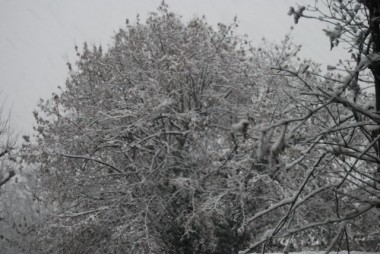Snowtree – photo by Liz Mathews
When a writer as historically aware and politically astute as Maureen Duffy subtitles a new novel ‘A Fable’, something interesting is in store. In Times Like These doesn’t disappoint such expectations; it’s provocative, funny, unsettling, and twists to an unexpected conclusion. There’s a lot to discuss, a lot to (re)consider, a lot of entertainment on the way. One gets the feeling that the author enjoyed writing this one.
In many ways it’s a playwright’s novel – short scenes carry the action forward with dialogue, there are jump-cuts and close-ups, newsflashes as well as big set pieces; the story moves fast and doesn’t pause for pedestrian explanations. This works particularly well for the central characters, Terry and Paul, a couple (historian-politician and artist) whose lesbian relationship is a given.
The premiss is that in the near future an independent Scotland comes to head a powerful Celtic Alliance while an ever-smaller England becomes more and more fractured and isolated. Tribalism and neo-fascist ideologies gain ground, civil liberties start to erode. There are some brilliant evocations of a future London, deserted by world finance, disintegrating yet still just about functioning for tourists.
Against this convincing scenario of a nation unravelling, some time in the not too distant future, is set a narrative of the remote past in the Celtic world of the monk Colm Cille, mapping the slow growth of alliances between little warring kingdoms, and the growing possiblities of art, books, civilization, in times of peace. The two apparently distant strands create a mutually-revealing commentary on the contrasting yet not dissimilar situations.
There are some wry funny scenes of the art world (too many artists will know just how Paul feels when the wealthy client/patron thinks she’s selling herself, not her work), academe and political life; almost satire but – unfortunately – all too recognisable. Then the royals are given some hilarious conversations. There are some genuinely scary moments as well; tribal terrorists’ bombing and burnings which threaten the characters the reader has come to care about.
Without giving the plot away too much, it’s not without hope at the end; a heartening suggestion that art is what may save civilization. But the portrayal of political extremism, bigotry and xenophobic nationalism is depressingly recognisable, as is the chaos involved in re-negotiations of nationhood. Maureen Duffy has let her richly-stocked imagination go to work on all this, but the result is a fable – from which lessons can be learnt – not necessarily a prophecy.
As a Londoner with Scots connections, I’m still hoping that there will be independence for Scotland soon. (The Union of 1707 is comparatively recent history, although James VI & I hoped to unite the separate kingdoms a hundred years or so before.) Since then, Scotland has maintained a dignified and convincing separate nationhood which deserves recognition, symbolised for me by the taxi-driver – in a tartan taxi advertising whisky – who drove two lost Sassenachs from Leith to Waverley Station just in time for the train, then refused to be paid, explaining he’d done it ‘for the honour of Scotland.’
But I certainly hope no country goes through the convulsions Maureen Duffy describes so convincingly, before finding equilibrium.
This is a novel to read now, in times like these, and then revisit with hindsight, after time has told…
